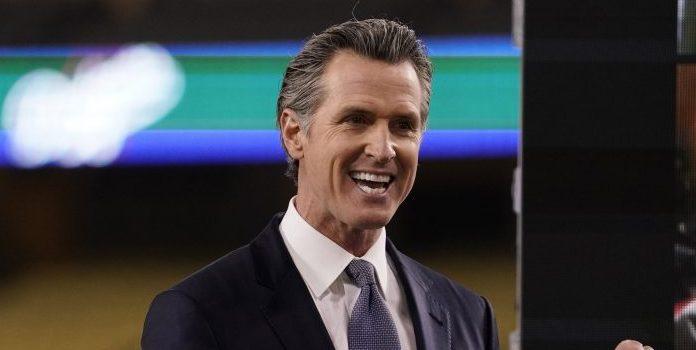(Luis Cornelio, Headline USA) California Gov. Gavin Newsom faced sharp criticism for his pandemic-era mandates, including the shutdowns of beaches and outdoor dining despite limited evidence of their effectiveness.
During an interview on NewsNation with Chris Cuomo, Adam Carolla, briefly co-hosting, pressed Newsom on his decision to close beaches.
“Governor, why did you shut the beaches in California during COVID?” Carolla queried, catching Newsom off guard from his expected topic of the CNN debate.
Newsom unobtrusively responded, “Yeah, we were working with the information available at the time. We didn’t fully understand the virus.”
Carolla persisted, challenging, “So, you didn’t know anything so why did you shut the beaches?”
This time, Newsom defended his record, claiming, “Early in the pandemic, there were concerns about transmission. We acted cautiously to save lives.”
Carolla sarcastically retorted, “So you didn’t let them go into sunshine and get vitamin D and exercise—so you shut the beaches, oh okay. You’re arrested guy was paddle boarding in the bay.”
Newsom seemed uncomfortable and replied with a smirk, “Always good to see you, Adam.”
Undeterred, Carolla pressed further, “And why shut down outdoor dining?”
“I’m looking forward to the debate,” Newsom deflected, trying to steer the conversation.
In 2020, Newsom came under fire after he was busted dining maskless with Democratic donors. At the time, the governor had demanded Californians avoid Thanksgiving gatherings.
In response to the scandal, Newsom conceded he was wrong and apologized.
“While the First Partner and I followed the restaurant’s health protocols and took safety precautions, I should have modeled better behavior and not joined the dinner,” he claimed.
But Newsom is no stranger to scandals.
Just on Friday, he was ridiculed after attempting to attack former President Donald Trump with Stormy Daniels’s unproven claims.
Yet, Newsom, during his tenure as San Francisco mayor from 2004 to 2011, was rocked with controversy when news broke of his affair with a secretary, who happened to be the wife of his campaign manager.
His office then paid $10,000 to the same woman, raising serious ethical questions.

